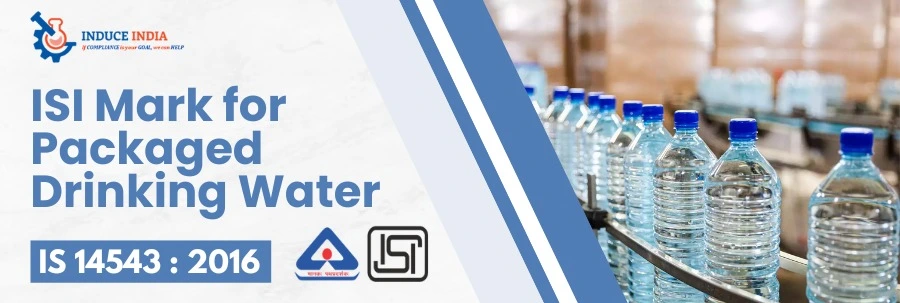We all must have seen the ISI mark on some item at some time or the other. Have you ever wondered what is this ISI mark? ISI mark stands for Indian Standards Institute which is a mark proposed by BIS (Bureau of Indian Standards), Govt. of India. ISI mark ensures the quality and regulation of a product as per BIS.
ISI Mark for Packaged Drinking Water
The Bureau of Indian Standards has made ISI Mark mandatory for Packaged Drinking Water.
All Packaged Drinking Water products are subjected to mandatory ISI Mark Certification as per Indian Standard IS 14543.
Now you cannot sell your product in the Indian consumer market without showing ISI mark clearly on your products.
Benefits of ISI Mark on Product
Having an ISI Mark Certification for packaged drinking water offers several significant benefits, including:
1. Ensures Product Quality: ISI mark ensures that the packaged drinking water you are selling meets specified quality standards by Bureau of Indian Standards (BIS) and it guarantees the purity of water without harmful chemicals and microorganisms.
ISI mark shows that you are delivering a quality product to your consumers.
2. Compliance with Regulations: In India, it is a legal requirement for packaged drinking water that it carries the ISI mark according to the specified BIS standards.
ISI mark certification ensures that the product complies with the specified regulations, and it helps manufacturers or importers avoid legal issues and potential penalties.
It is also crucial for long-term sustainability of your business if your product complies with regulatory standards.
3. Increases Consumer Confidence: We all are familiar with ISI Mark it is the symbol of quality and safety in India. Consumer trust if any product carries ISI mark and it helps to increase sales and brand loyalty in the market directly or indirectly.
ISI mark shows that the product has undergone rigorous testing meets established standards and gives consumers confidence in their purchase.
4. International Recognition: ISI mark is also recognized internationally it is not limited to the Indian market. If there is ISI mark on your product it signifies that the product meets rigorous quality standards, which can facilitate your business’s entry into the international markets.
So, if you have aspirations to expand your packaged drinking water business beyond India’s borders, ISI mark certification can help.
5. Competitive Advantage: If you have ISI Mark Certification and your product carries ISI Mark, it sets you apart from your competitors who do not have ISI Mark certification. In the Indian market ISI mark is well recognized and respected by both, the consumers and the businesses and this difference can be a strong selling point and give your brand a competitive edge in the market.
In summary, we can say that obtaining ISI mark certification for packaged drinking water is not only a legal requirement but also a strategic move that can increase your product’s reputation, consumer trust, and market competitiveness, both domestically and internationally.
ISI Mark Process for Packaged Drinking Water
Obtaining ISI Certification for your product involves a series of steps and compliance with specific guidelines set by the Bureau of Indian Standards (BIS). Here’s an overview of the process:
1. DOCUMENTATION
For ISI mark license basically needs two types of documents
1. General Company KYC like:
a. premises document
b. company reg. Documents like MOA, AOA/Partnership deed/ LLP register
c. Udyam registration (MSME)
d. GST copy
2. Technical Documents –
You will need some technical documents like:
a. Testing facility details
b. manufacturer facility details
c. process flowchart
d. product drawing
e. raw material TC. etc.
3. INSTALLATION OF IN-HOUSE LABORATORY
It is the most important and complicated step. To apply in the BIS, manufacturers need to install testing facilities to control their product quality. It is a mandatory requirement to get BIS license, these details need technical expertise to identify the testing requirement of product and least count, range, and size of equipment.
4. SAMPLE TESTING
Manufacturers need to figure out their scope of license and grade/variety of products. On the basis of license scope, they have tested their sample with BIS lab.
5. SUBMISSION OF APPLICATION
After receiving the report installation of lab equipment to BIS final application will be submitted.
6. NOMINATED OFFICER
The head of department will nominate an officer to check the application.
In case of an incomplete application, the officer will raise the query and they may send closer notice.
7. AUDIT
Audit will be conducted on the factory premises. The audit officer will verify.
• Manufacturing process
• Manufacturing facility
• Test facility
• Test process
• Raw material
• Competency of OCT etc.
8. Grant of ISI Mark Certification:
If audit is satisfactory means your product samples have successfully passed the required testing, and your manufacturing facilities and quality management system meet the necessary standards, the license shall be granted within 5-10 days. The ISI mark can then be affixed to your certified products, indicating compliance with the Indian Standard.
It’s often beneficial to consult with BIS Consultants, such as INDUCE INDIA, to navigate the complex certification process effectively.
These consultants can provide guidance, and assistance with documentation, and help you understand the specific requirements of the ISI certification process, ensuring that your application is complete and meets all necessary criteria.
Conclusion
Remember that the process may vary slightly depending on the type of product and the specific Indian Standard it falls under. It’s crucial to stay up-to-date with the latest requirements and guidelines from BIS and consult with experts to ensure a smooth and successful ISI Certification process for your product.



